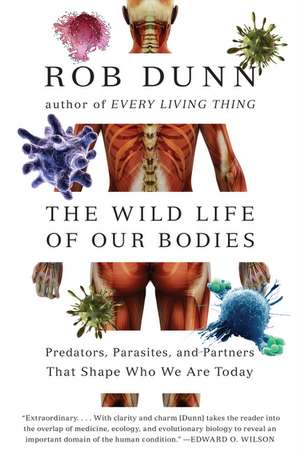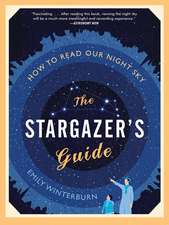The Wild Life of Our Bodies: Predators, Parasites, and Partners That Shape Who We Are Today
Autor Dr. Rob Dunnen Limba Engleză Paperback – 22 dec 2014
Biologist Rob Dunn reveals the crucial influence that other species have upon our health, our well being, and our world in The Wild Life of Our Bodies—a fascinating tour through the hidden truths of nature and codependence. Dunn illuminates the nuanced, often imperceptible relationships that exist between homo sapiens and other species, relationships that underpin humanity’s ability to thrive and prosper in every circumstance. Readers of Michael Pollan’s The Omnivore’s Dilemma will be enthralled by Dunn’s powerful, lucid exploration of the role that humankind plays within the greater web of life on Earth.
Preț: 113.51 lei
Nou
Puncte Express: 170
Preț estimativ în valută:
21.72€ • 23.67$ • 18.30£
21.72€ • 23.67$ • 18.30£
Carte disponibilă
Livrare economică 02-16 aprilie
Preluare comenzi: 021 569.72.76
Specificații
ISBN-13: 9780061806469
ISBN-10: 0061806463
Pagini: 304
Dimensiuni: 135 x 203 x 17 mm
Greutate: 0.27 kg
Editura: HarperCollins Publishers
Colecția HarperPerennial
ISBN-10: 0061806463
Pagini: 304
Dimensiuni: 135 x 203 x 17 mm
Greutate: 0.27 kg
Editura: HarperCollins Publishers
Colecția HarperPerennial
Textul de pe ultima copertă
In the name of progress and clean living, we scrub much of nature off our bodies and try to remove whole kinds of life—parasites, bacteria, mutualists, and predators. To modern humans, nature is the landscape outside. Biologist Rob Dunn contends that while "clean living" has benefited us in some ways, it has also made us sicker in others.
We are trapped in bodies that evolved to deal with the dependable presence of hundreds of other species. This disconnect from the web of life has resulted in unprecedented effects that immunologists, evolutionary biologists, psychologists, and other scientists are only beginning to understand. Diabetes, autism, allergies, many anxiety disorders, autoimmune diseases, and even tooth, jaw, and vision problems are increasingly plaguing bodies that have been removed from the ecological context in which they existed for millennia.
Dunn considers this crossroads at which we find ourselves. Through the stories of visionaries, Dunn argues that we can create a richer nature, one in which we choose to surround ourselves with species that benefit us, not just those that, despite us, survive.
We are trapped in bodies that evolved to deal with the dependable presence of hundreds of other species. This disconnect from the web of life has resulted in unprecedented effects that immunologists, evolutionary biologists, psychologists, and other scientists are only beginning to understand. Diabetes, autism, allergies, many anxiety disorders, autoimmune diseases, and even tooth, jaw, and vision problems are increasingly plaguing bodies that have been removed from the ecological context in which they existed for millennia.
Dunn considers this crossroads at which we find ourselves. Through the stories of visionaries, Dunn argues that we can create a richer nature, one in which we choose to surround ourselves with species that benefit us, not just those that, despite us, survive.
Recenzii
“A pleasure to read. He is not a biologist moonlighting as a writer; he is both. Dunn also does a wonderful job interspersing history, research, and speculation with real-life human beings. He has a natural flair for drama and tension . . . a highly readable, informative mashing of ideas and disciplines.” — Boston Globe
“Grabbing the reader from the start . . . Dunn moves through the answer to these and other questions with a sure use of language, scientific research, and humor-all of which combined keep the reader highly engaged. . . . Mr. Dunn is a thorough and talented writer.” — New York Journal of Books
“An extraordinary book about a previously little explored subject. With clarity and charm the author takes the reader into the overlap of medicine, ecology, and evolutionary biology to reveal an important domain of the human condition.” — Edward O. Wilson, University Research Professor Emeritus, Harvard University
“[Dunn is] a master at applying the principle of administering a spoonful of sugar (i.e., humor) to make the “medicine” of complicated scientific information not merely interesting but gripping. Nothing less than an every-person’s handbook for understanding life, great and small, on planet Earth.” — Booklist (starred review)
“Adding touches of humor along the way, Dunn deftly explains complex biological systems for the general reader. […] Highly recommended for nature aficionados, this book should inspire many lively discussions.” — Library Journal
“Grabbing the reader from the start . . . Dunn moves through the answer to these and other questions with a sure use of language, scientific research, and humor-all of which combined keep the reader highly engaged. . . . Mr. Dunn is a thorough and talented writer.” — New York Journal of Books
“An extraordinary book about a previously little explored subject. With clarity and charm the author takes the reader into the overlap of medicine, ecology, and evolutionary biology to reveal an important domain of the human condition.” — Edward O. Wilson, University Research Professor Emeritus, Harvard University
“[Dunn is] a master at applying the principle of administering a spoonful of sugar (i.e., humor) to make the “medicine” of complicated scientific information not merely interesting but gripping. Nothing less than an every-person’s handbook for understanding life, great and small, on planet Earth.” — Booklist (starred review)
“Adding touches of humor along the way, Dunn deftly explains complex biological systems for the general reader. […] Highly recommended for nature aficionados, this book should inspire many lively discussions.” — Library Journal
Notă biografică
Rob Dunn is an associate professor in the Department of Biological Sciences at North Carolina State University and the author of several books, including Every Living Thing. A rising star in popular-science journalism, he writes for National Geographic, Natural History, Scientific American, BBC Wildlife, and Seed magazine. He lives in Raleigh, North Carolina, with many thousands of wild species, including at least one species of mite living on his head.


